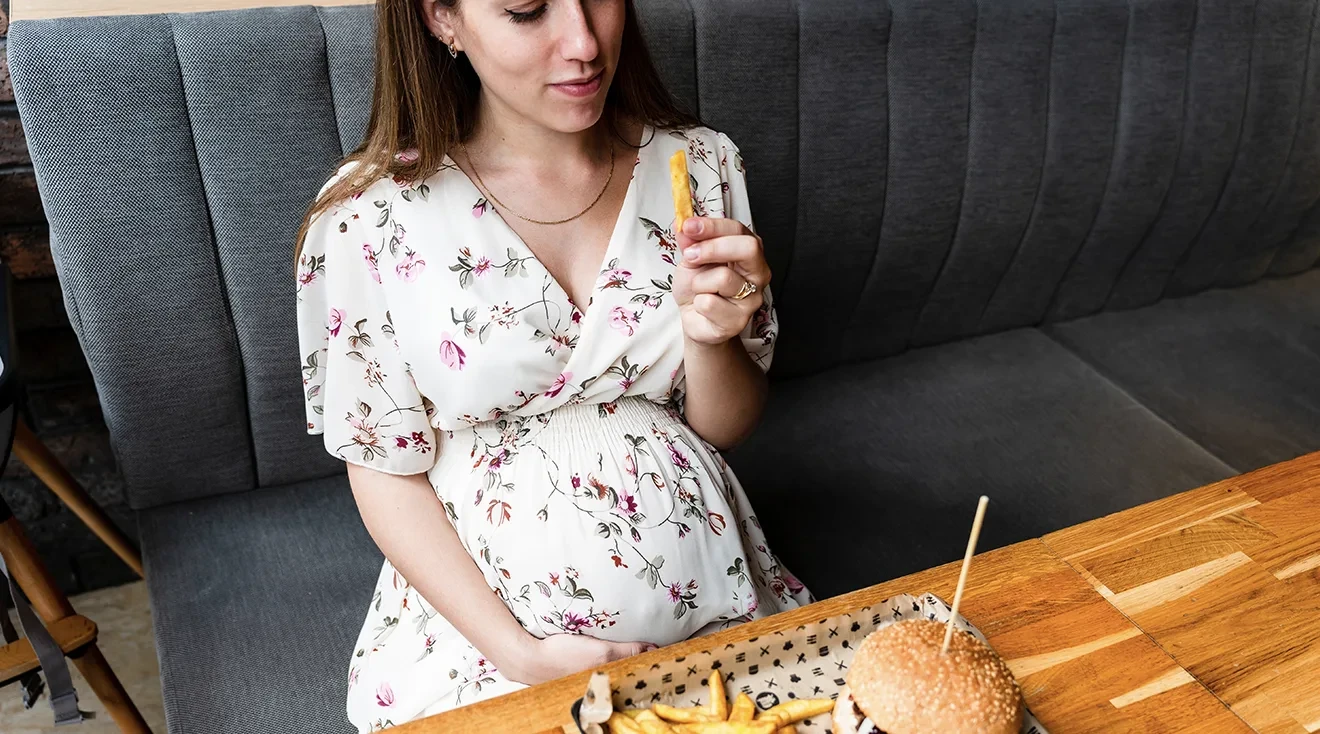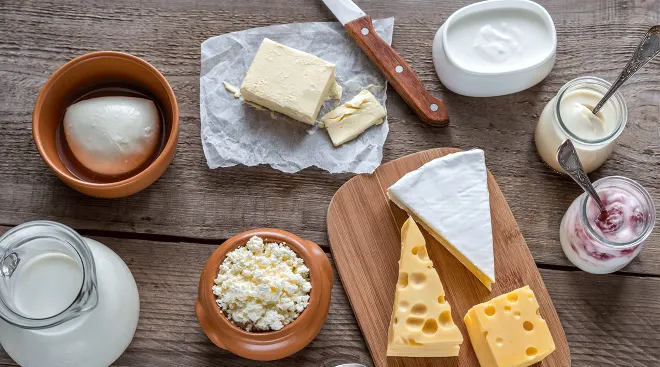What to Do if You Experience Food Poisoning While Pregnant
Chances are everyone will experience food poisoning at least once in their lifetime. But what happens if you get food poisoning while pregnant? Unfortunately, it can be more common for pregnant people—and also more serious. This is largely why food safety is so crucial during those nine+ months. Keep reading to learn more about experiencing food poisoning during pregnancy, including what causes it, symptoms to look for, how to treat it and ways to prevent it in the first place.
Food poisoning during pregnancy—and outside of pregnancy—occurs when you eat food contaminated with harmful microorganisms (such as bacteria, parasites and viruses), and consequently get sick, according to the Food and Drug Administration (FDA).
“Food poisoning is a general term that can be caused by a variety of microorganisms,” explains Chelsea Canon, MD, a fellow in reproductive endocrinology and infertility at Icahn School of Medicine at Mount Sinai in New York City and Reproductive Medicine Associates of New York. “You may hear someone describe having ‘food poisoning’ but this can range from a very mild, self-limited infection to something potentially more severe.”
It’s also important to differentiate experiencing food poisoning while pregnant from having a stomach bug. According to Cleveland Clinic, while both have similar symptoms, the onset and resolution for food poisoning is typically quicker than it is for stomach bugs.
Morning sickness vs. food poisoning when pregnant
During the first trimester of pregnancy—when so many things might be making you feel queasy—it can be tough to figure out whether you’ve got food poisoning or if it’s your run-of-the-mill morning sickness. But the biggest difference between the two is their symptoms. “Morning sickness is very common—usually [you’ll have] nausea and food aversions. In extreme cases, [people] cannot keep down food or water,” says Megan Pallister, MD, an ob-gyn based in Houston, Texas. “Food poisoning is different in that, while you can have nausea and vomiting, there are other GI-related symptoms as well, like watery diarrhea.” Canon agrees, saying food poisoning can also cause mild fevers, body aches and abdominal pain, while morning sickness will not.
According to Canon, cases of food poisoning are over 10 times higher in pregnancy than those among the general population. This is because the gastrointestinal tract is extra sensitive during pregnancy, Pallister explains, adding that pregnant people are also predisposed to certain infections: “Their immune system is compromised more than that of a non-pregnant patient.”
Canon says you can take comfort knowing that while mild to moderate cases aren’t uncommon, they typically won’t affect a pregnancy. Moreover, the risk for more serious foodborne illnesses, like listeriosis, is very low. “[It’s] been quoted at around 3.5 cases per 100,000 people—but since [listeriosis] can have serious repercussions, it’s the most well studied in pregnant patients,” Canon adds. (More on this below.)
As mentioned, there are many different types of microorganisms that can cause food poisoning in pregnancy, including salmonella, listeria and E. coli. Here’s what to know about each of these:
-
Escherichia coli (E. coli): There are many different strains of E. coli, some of which are harmless and some which may cause food poisoning, notes the Centers for Disease Control and Prevention (CDC). According to Jennifer Jolorte Doro, CN, a New York City-based clinical nutritionist with Oula Health, E. coli exposure may come from raw vegetables, undercooked meats unpasteurized milk and poorly processed food (like salad greens).
-
Salmonella: This is caused by salmonella bacteria, which may occur in raw or undercooked meat, fish and eggs, as well as unpasteurized milk and other dairy products made from infected poultry, the American Pregnancy Association notes. Salmonella typically goes away on its own, but in severe cases it can cause serious issues like extreme dehydration, bacteria in the bloodstream and, consequently, meningitis, which may also be passed on to baby.
-
Listeriosis: Listeriosis is one of the most serious types of food poisoning to have when pregnant. It’s caused by listeria, a bacteria found in soil, water and certain animals, such as cattle and poultry, the American College of Obstetricians and Gynecologists (ACOG) says. It can also have serious adverse effects on baby and increase the risk of miscarriage, stillbirth and preterm birth. Rest assured that, though pregnant women are more likely to get listeriosis, it’s still very uncommon.
Symptoms of food poisoning when pregnant are pretty similar to those outside of pregnancy, Canon says. The most common symptoms of food poisoning during pregnancy are nausea, vomiting, diarrhea, stomach pain and cramps. You might also notice flu-like symptoms, such as a fever, chills, muscle aches, fatigue and headaches, Pallister says. If you experience any of these symptoms or any other GI pain that’s unusual, let your provider know right away. Your doctor will be able to diagnose you based on your symptoms, Pallister adds. They’ll check your vitals, and may also take blood and stool samples to culture for bacteria growth.
Experts say there are also some red-flag symptoms that should prompt you to seek emergency medical care. These include:
- The inability to keep down any food or water
- Multiple episodes of diarrhea within a 24-hour period
- Symptoms of dehydration (dizziness, lightheadedness or a fast heartbeat)
- Feeling like you’re about to faint or pass out
- Large amounts of blood in stools
- A fever of 100 degrees Fahrenheit (or higher) that lasts for over 24 hours
- A high fever of 103 degrees Fahrenheit or higher
- Any extreme pain
- Decreased fetal movement
“These symptoms can sometimes mean that there’s a severe gut infection going on, and may warrant treatment in the hospital,” advises Kendra Segura, MD, a a California-based ob-gyn. “If loved ones find mom-to-be behaving strangely or out-of-character, that would also warrant a 911 call.”
As mentioned, having food poisoning while pregnant can have consequences, so it’s important to get evaluated and treated promptly. “Some infections can be severe and lead to preterm labor, fetal loss or sepsis in a newborn baby,” says Keri Bergin, MD, a fellow in reproductive endocrinology and infertility at Icahn School of Medicine at Mount Sinai in New York City and Reproductive Medicine Associates of New York. Plus, the risk of dehydration is also a big concern during pregnancy, as this could cause neural tube defects, low amniotic fluid and even preterm birth, the APA notes.
Food poisoning can also raise issues when trying to conceive and during early pregnancy. During this period, any infection—including food poisoning—can cause inflammation and affect the uterine lining’s receptivity to [embryo] implantation and early pregnancy, Bergin explains. (IVF patients should speak with their provider and consider delaying embryo transfer until the infection is treated, she adds.) You’ll want to let your doctor know if you’re newly pregnant and suffering from food poisoning. They’ll be able to help you discern the best course of treatment based on your unique circumstances.
While all of this sounds scary, know that it’s really only applicable to a small percentage of food poisoning cases during pregnancy. Overall, outcomes for food poisoning during pregnancy “are typically good, as most cases are mild,” Bergin says.
The most important rule for treating food poisoning while pregnant is to stay hydrated, so keep sipping water, juice and soups. “Really push the fluids,” says Sharon Phelan, MD, a professor of obstetrics and gynecology at the University of New Mexico. You might also want to try coconut water, Pedialyte or diluting a sports drink like Gatorade to replenish your electrolytes (without overloading on sugar). Of course, always check in with your doctor for specific recommendations. For any severe dehydration, they may even recommend an IV drip at the hospital, Canon says.
To keep food down, Pallister recommends eating a bland diet of crackers, bread and rice. Bergin suggests using ginger, doxylamine (also known as Unisom), vitamin B6 or Benadryl to manage nausea, as well as pregnancy-safe over-the-counter antacids and heartburn medications to help symptoms of reflux. For an over-the-counter antidiarrheal, she recommends loperamide (Imodium), but only for mild cases—and always check with your doctor first. If you have a fever, and your provider suspects the bacterial infection is serious, you’ll likely be treated with antibiotics, both Canon and Pallister say.
Preventing food poisoning during pregnancy is one of the reasons why prioritizing food safety is so important, Phelan explains. According to the FDA. Below, some steps to help prevent food poisoning while pregnant (or not):
- Wash your hands and utensils often
- Clean cooking surfaces and counters often
- Separate and keep uncooked foods away from ready-to-eat foods
- Cook all food to the proper temperatures
- Refrigerate or freeze all uneaten food promptly
- Thaw foods in the refrigerator or microwave (not on the counter)
- Thoroughly clean all fruits and vegetables
Along with these practices, Bergin and Pallister recommend avoiding certain foods altogether during pregnancy due to the risk they pose for foodborne illnesses, including:
- Deli and lunch meats, meats sliced fresh at the deli counter and hot dogs (unless they’re all heated or reheated properly and thoroughly)
- Unheated cheese slices from a deli
- Unpasteurized dairy products, including milk, cheeses and eggs
- Refrigerated smoked seafood
- Pre-made deli salads (like coleslaw, potato, tuna or chicken salad)
- Refrigerated pate and meat spreads
- Raw or undercooked fish and meat (like carpaccio and sushi)
- Unwashed raw fruits and vegetables
- Raw or lightly cooked sprouts
- Cut melon that’s been sitting out (especially when it’s hot out)
- Fresh squeezed juice (as it may not always be pasteurized)
As the FDA notes, as long as you follow food safety guidelines, preventing food poisoning during pregnancy can be easier than you might think. And if you do find yourself with an upset stomach, don’t hesitate to give your provider a call. They’ll help you get to the bottom of the cause and offer treatment options safe for you and baby.
Please note: The Bump and the materials and information it contains are not intended to, and do not constitute, medical or other health advice or diagnosis and should not be used as such. You should always consult with a qualified physician or health professional about your specific circumstances.
Plus, more from The Bump:
Keri Bergin, MD, is a fellow in reproductive endocrinology and infertility at Icahn School of Medicine at Mount Sinai in New York City and Reproductive Medicine Associates of New York. She earned her medical degree from Sidney Kimmel Medical College at Thomas Jefferson University and completed her ob-gyn residency at Albany Medical Center in Albany, New York.
Chelsea Canon, MD, is a fellow in reproductive endocrinology and infertility at Icahn School of Medicine at Mount Sinai in New York City and Reproductive Medicine Associates of New York. She earned her medical degree from Wake Forest School of Medicine and completed her ob-gyn residency at New York Presbyterian-Weill Cornell in New York City.
Jennifer Jolorte Dolo, CN, is a New York City-based clinical nutritionist with Oula. She also serves as a postpartum chef with A Lite Bite and is the culinary director of the health platform Chiyo. She has a master’s degree in clinical nutrition from the Maryland University of Integrative Health, and is a certified breastfeeding counselor, birth doula and prenatal yoga instructor.
Megan Pallister, MD, is an ob-gyn based in Houston, Texas, as well as a Lansinoh Clinical Advisory Network member. She completed her medical degree at the University of Texas Medical Branch School of Medicine and her residency at Baylor College of Medicine.
Sharon Phelan, MD, is a professor of obstetrics and gynecology at the University of New Mexico School of Medicine. She earned her medical degree and completed her ob-gyn residency at the University of New Mexico.
Kendra Segura, MD, MPH, FACOG, is a Los Angeles-based board-certified ob-gyn, as well as an entrepreneur, author, motivational speaker and cast member of Bravo’s hit TV series Married to Medicine: Los Angeles. She earned her medical degree at Ross University School of Medicine in 2011 and completed her residency at Rochester General Hospital in Rochester, New York.
Food and Drug Administration (FDA), What Is Foodborne Illness? Food Safety for Moms to Be, September 2018
Cleveland Clinic, Stomach Flu or Food Poisoning? How To Tell, August 2022
Centers for Disease Control and Prevention (CDC), E. coli (Escherichia coli), December 2022
American Pregnancy Association (APA), Treating Salmonella Naturally During Pregnancy, 2023
American College of Obstetricians and Gynecologists (ACOG), Listeria and Pregnancy, August 2022
American Pregnancy Association (APA), Dehydration During Pregnancy, 2023
Centers for Disease Control and Prevention (CDC), Prevent Listeria, April 2023
Learn how we ensure the accuracy of our content through our editorial and medical review process.
Navigate forward to interact with the calendar and select a date. Press the question mark key to get the keyboard shortcuts for changing dates.





















































